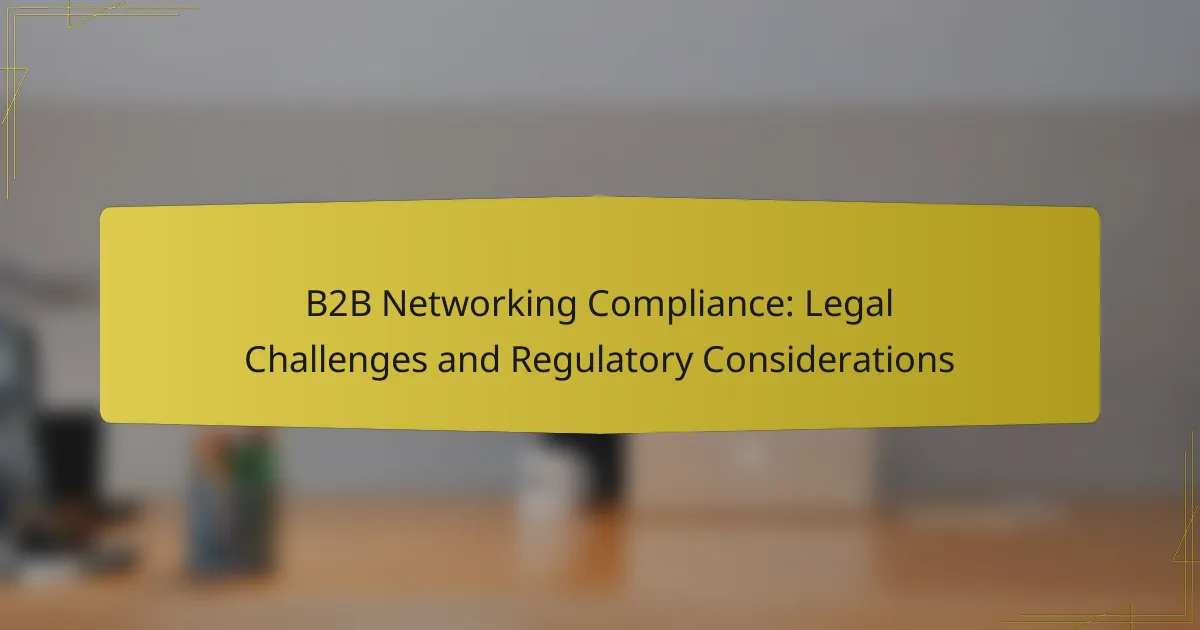B2B networking compliance is critical for businesses as it involves navigating a complex landscape of legal challenges and regulatory considerations. Key areas of focus include data privacy regulations, intellectual property rights, and anti-competitive practices, which require careful management to mitigate risks. By implementing structured processes and adhering to legal standards, businesses can foster ethical practices and avoid potential legal pitfalls in their networking efforts.
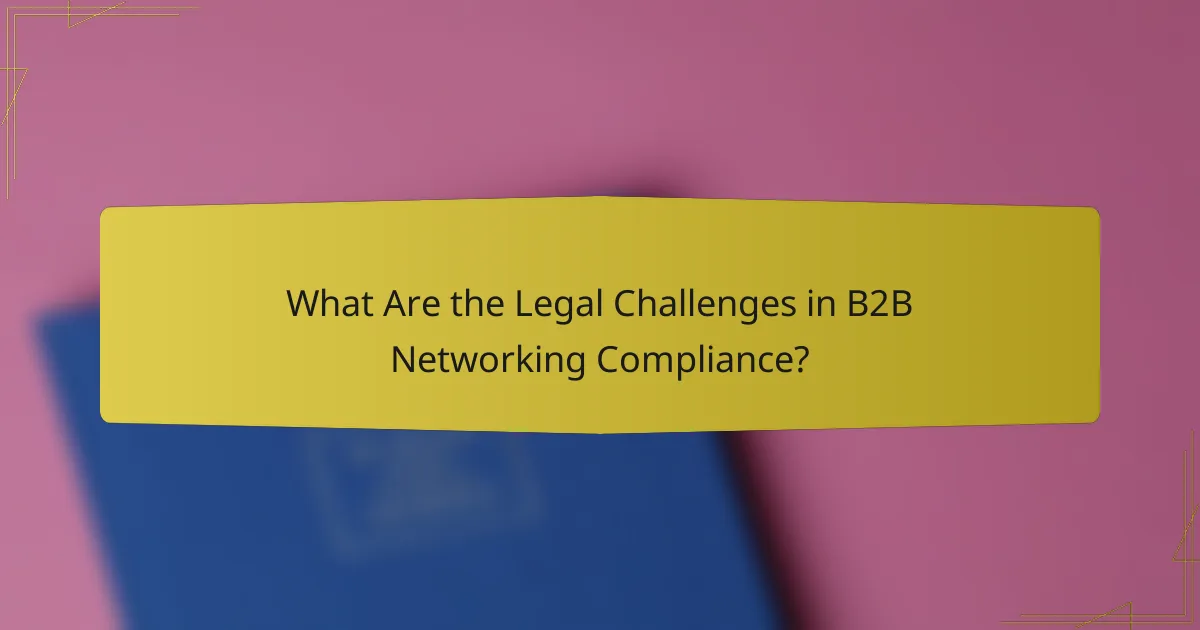
What Are the Legal Challenges in B2B Networking Compliance?
B2B networking compliance involves navigating various legal challenges that can impact business operations. Key issues include data privacy regulations, contractual obligations, intellectual property rights, anti-competitive practices, and cross-border compliance, each presenting unique considerations for businesses.
Data privacy regulations
Data privacy regulations, such as the General Data Protection Regulation (GDPR) in Europe and the California Consumer Privacy Act (CCPA) in the United States, impose strict requirements on how businesses collect, store, and use personal data. Companies must ensure they have explicit consent from individuals before processing their data and must implement robust security measures to protect this information.
Failure to comply with these regulations can result in hefty fines, often amounting to millions of dollars, and damage to a company’s reputation. Businesses should regularly review their data handling practices and consider appointing a Data Protection Officer (DPO) to oversee compliance efforts.
Contractual obligations
Contractual obligations in B2B networking require clear agreements that outline the responsibilities and expectations of each party. These contracts should address issues such as service levels, confidentiality, and liability to prevent disputes and ensure compliance with legal standards.
Businesses should conduct thorough due diligence before entering agreements and regularly review contracts to ensure they remain compliant with changing laws and regulations. It’s advisable to involve legal counsel in drafting and negotiating contracts to mitigate risks.
Intellectual property issues
Intellectual property (IP) issues can arise in B2B networking when businesses share proprietary information or technology. Companies must protect their IP through patents, trademarks, and copyrights while respecting the IP rights of others to avoid infringement claims.
To manage these risks, businesses should implement non-disclosure agreements (NDAs) when sharing sensitive information and conduct IP audits to identify and protect their assets. Regular training on IP rights for employees can also help prevent unintentional violations.
Anti-competitive practices
Anti-competitive practices, such as collusion or price-fixing, pose significant legal challenges in B2B networking. Regulatory bodies, such as the Federal Trade Commission (FTC) in the U.S. and the European Commission in the EU, actively monitor and enforce laws against such practices to promote fair competition.
Businesses should establish compliance programs that educate employees about antitrust laws and encourage reporting of suspicious activities. Regular audits and assessments can help identify potential anti-competitive behaviors before they escalate into legal issues.
Cross-border compliance
Cross-border compliance involves adhering to the legal requirements of multiple jurisdictions, which can be complex due to varying regulations. Companies engaged in international B2B networking must navigate different data protection laws, tax regulations, and trade restrictions.
To address these challenges, businesses should conduct a thorough analysis of the legal landscape in each country they operate in and consider working with local legal experts. Establishing a compliance framework that accounts for these differences can help mitigate risks associated with cross-border operations.
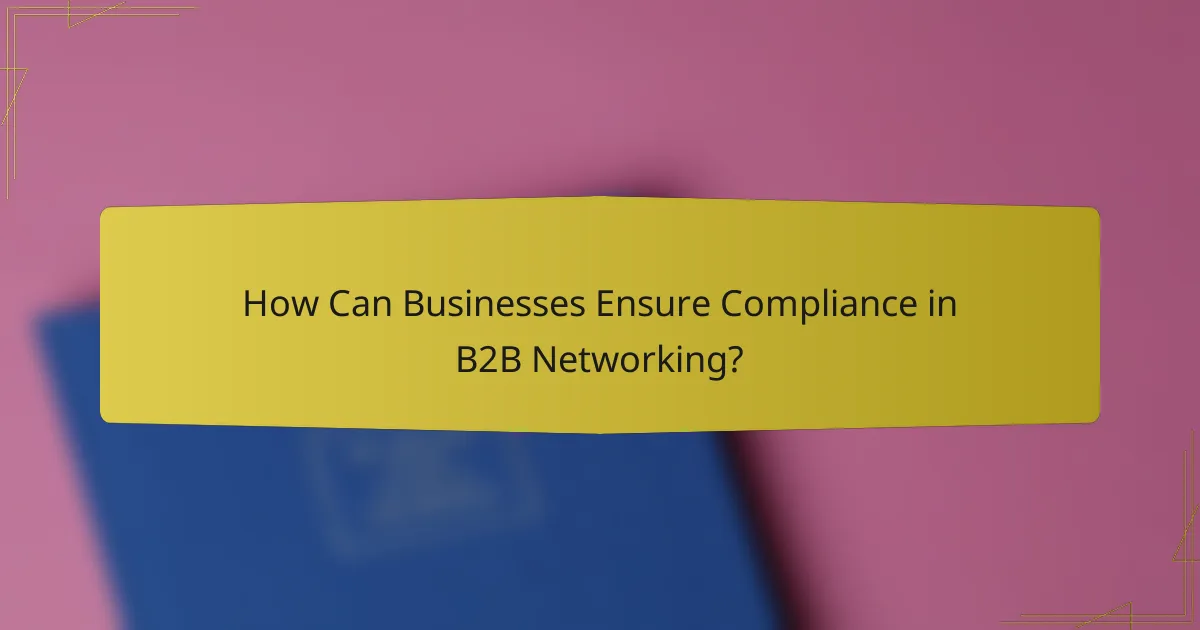
How Can Businesses Ensure Compliance in B2B Networking?
Businesses can ensure compliance in B2B networking by implementing structured processes that adhere to legal and regulatory standards. This involves training employees, utilizing technology, conducting audits, and establishing clear policies to mitigate risks associated with non-compliance.
Implementing compliance training
Compliance training is essential for ensuring that employees understand the legal requirements and ethical standards relevant to B2B networking. Regular training sessions should cover topics such as data protection, anti-bribery laws, and industry-specific regulations.
Consider using a mix of online courses and in-person workshops to cater to different learning styles. It’s beneficial to assess employee understanding through quizzes or practical scenarios to reinforce key concepts.
Utilizing compliance software
Compliance software helps businesses automate and streamline their compliance processes, reducing the risk of human error. These tools can assist in tracking regulatory changes, managing documentation, and ensuring that all necessary compliance checks are performed.
When selecting compliance software, look for features such as real-time reporting, integration with existing systems, and user-friendly interfaces. Popular options include tools that focus on data privacy, contract management, and risk assessment.
Conducting regular audits
Regular audits are crucial for identifying compliance gaps and ensuring that policies are being followed. These audits can be internal or conducted by third-party firms, providing an objective assessment of compliance practices.
Establish a schedule for audits, such as quarterly or bi-annually, and create a checklist of key compliance areas to review. This proactive approach can help catch issues early and minimize potential fines or legal challenges.
Establishing clear policies
Clear policies provide a framework for compliance in B2B networking, outlining expectations and procedures for employees. These policies should cover areas such as data handling, communication protocols, and conflict of interest guidelines.
Ensure that policies are easily accessible and regularly updated to reflect changes in regulations or business practices. Consider involving employees in the policy development process to foster a culture of compliance and accountability.
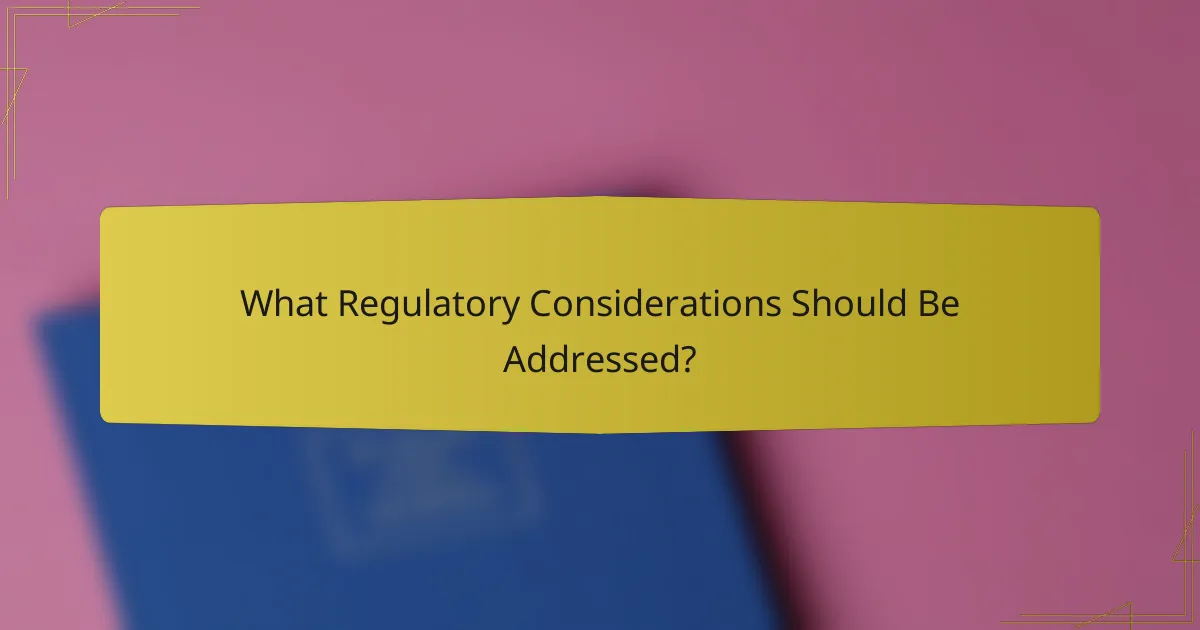
What Regulatory Considerations Should Be Addressed?
When engaging in B2B networking, it is essential to address various regulatory considerations that govern data protection and privacy. Compliance with regulations like GDPR and CCPA is crucial to avoid legal challenges and ensure ethical business practices.
GDPR implications
The General Data Protection Regulation (GDPR) imposes strict rules on how businesses collect, process, and store personal data of EU citizens. Companies must obtain explicit consent from individuals before processing their data and provide clear information about how it will be used.
Non-compliance can lead to significant fines, often reaching up to 4% of annual global turnover or €20 million, whichever is higher. Businesses should implement data protection measures and conduct regular audits to ensure compliance with GDPR standards.
CCPA requirements
The California Consumer Privacy Act (CCPA) grants California residents specific rights regarding their personal information, including the right to know, delete, and opt-out of the sale of their data. Businesses operating in California must provide clear disclosures about data collection practices and comply with consumer requests.
Failure to comply with CCPA can result in fines of up to $7,500 per violation. Companies should establish processes for handling consumer requests and ensure transparency in their data practices to mitigate risks associated with non-compliance.
Industry-specific regulations
Various industries may have additional regulatory requirements that impact B2B networking. For instance, healthcare organizations must comply with the Health Insurance Portability and Accountability Act (HIPAA), which mandates strict data privacy and security measures for patient information.
Financial institutions are subject to regulations like the Gramm-Leach-Bliley Act (GLBA), which requires them to protect consumers’ personal financial information. Businesses should identify and understand the specific regulations applicable to their industry to ensure comprehensive compliance and avoid potential legal issues.
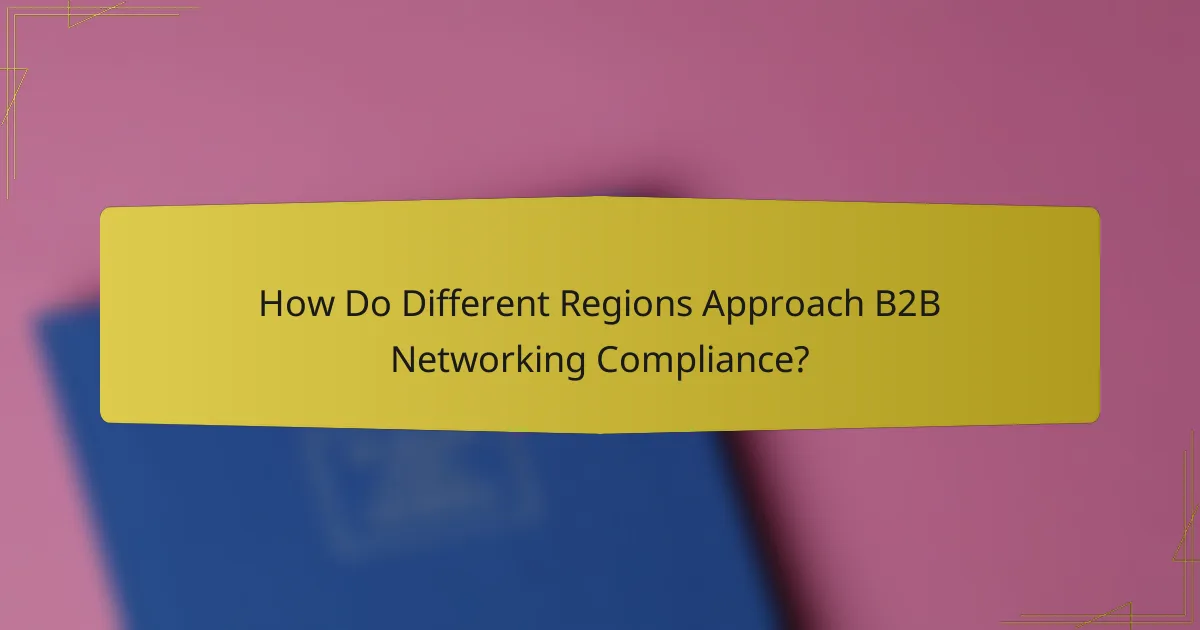
How Do Different Regions Approach B2B Networking Compliance?
Regions vary significantly in their approach to B2B networking compliance, influenced by local laws, cultural norms, and business practices. Understanding these differences is crucial for companies operating internationally to ensure they meet legal requirements and avoid penalties.
North America regulations
In North America, compliance is primarily governed by regulations such as the CAN-SPAM Act and the Telephone Consumer Protection Act (TCPA) in the United States. These laws focus on consent and transparency in communications, requiring businesses to obtain explicit permission before sending marketing messages.
Companies should implement clear opt-in processes and maintain accurate records of consent to avoid hefty fines. Regular audits of communication practices can help ensure adherence to these regulations.
EU compliance frameworks
The European Union enforces strict compliance frameworks, notably the General Data Protection Regulation (GDPR). This regulation mandates that businesses must have a lawful basis for processing personal data and requires transparency about data usage.
Organizations must appoint a Data Protection Officer (DPO) if they handle large volumes of personal data and conduct impact assessments for new projects. Non-compliance can result in fines reaching up to 4% of annual global turnover.
Asia-Pacific legal standards
In the Asia-Pacific region, legal standards for B2B networking compliance can vary widely. Countries like Australia have the Spam Act, which regulates electronic communications, while others may have less stringent rules.
Businesses should familiarize themselves with local laws, as some countries may require explicit consent for marketing communications. Establishing a compliance checklist tailored to each country can streamline adherence to these diverse regulations.
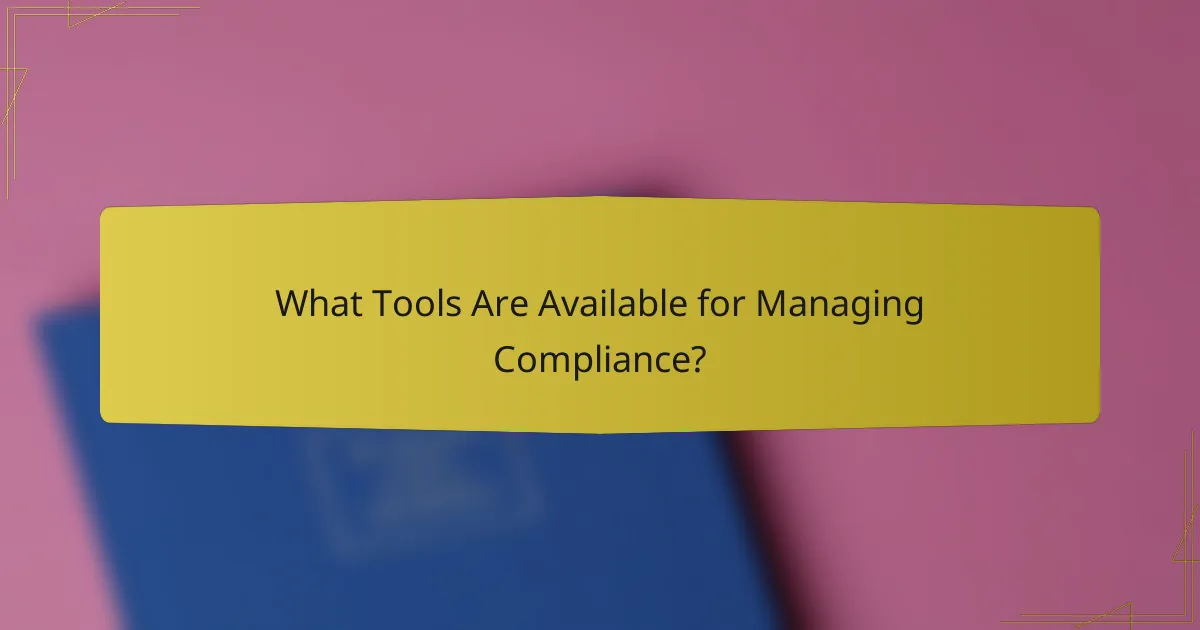
What Tools Are Available for Managing Compliance?
Managing compliance in B2B networking requires a variety of tools designed to streamline processes and ensure adherence to regulations. These tools help organizations track, manage, and report compliance-related activities efficiently.
Compliance management platforms
Compliance management platforms are software solutions that assist businesses in monitoring and managing compliance requirements. These platforms typically offer features such as risk assessment, policy management, and audit trails to ensure that organizations meet legal and regulatory standards.
When selecting a compliance management platform, consider factors like user-friendliness, integration capabilities with existing systems, and the specific compliance needs of your industry. Popular platforms include LogicGate, ComplyAdvantage, and GRC software like RSA Archer.
To maximize the effectiveness of these platforms, regularly update compliance data and train staff on using the tools. Avoid common pitfalls such as neglecting to customize the platform to fit your specific compliance landscape or failing to engage all relevant stakeholders in the process.
